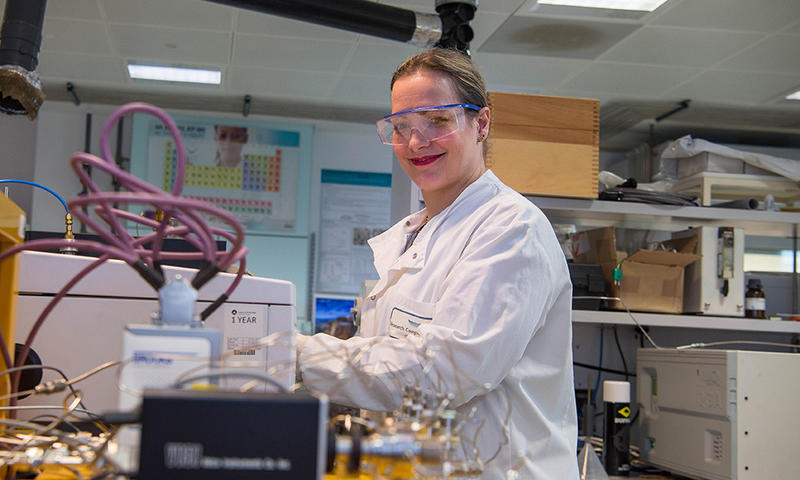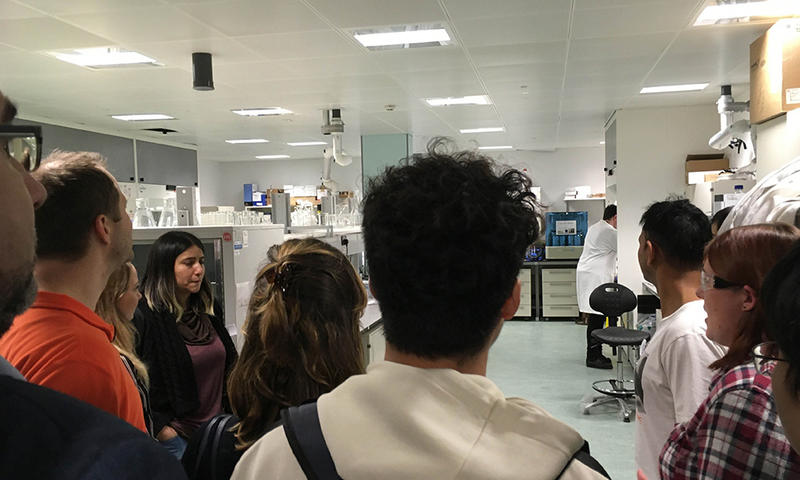Supporting Research

The UK Catalysis Hub is committed to supporting research across all catalysis disciplines and supporting the UK catalysis community. The Hub supports research through a number of mechanisms including (but not limited to) hosting researchers especially ECRs, enabling access to facilities and equipment, arranging workshops and facilitating dissemination at conferences, webinars and workshops. The Hub also participates in outreach activities. Requests for support have come from all over the UK catalysis community as a follow on from Hub grants but also from researchers who do not have direct funding from the Hub.
The Management Group of the Hub discusses each proposal to determine how interaction can benefit the project proposed, the Hub, and researchers involved to develop appropriate mechanism of interaction to strengthen proposals.
If you are writing a funding proposal and wish a letter of support from the Hub to detail the interactions with the Hub and its support please send an outline of the proposal including mechanisms of interaction with the Hub (e.g. a draft of the vision and approach for UKRI proposals or equivalent) and a draft letter of support to the UK Catalysis Hub Project Manager, Josie Goodall: josie.goodall@rc-harwell.ac.uk.
Please send required information at least two weeks prior to your application deadline.
Letters of Support procedure
The researcher should write their own letter, should outlining why they believe their work fits with Hub science themes and highlighting the national facility collaboration and interactions with the UK Catalysis Hub and the UK catalysis community. It should highlight what they will do to join in with the UK Catalysis Hub – e.g. organising a symposium or workshop. We expect all letters to clearly explain how the researcher plans to work with the UK Catalysis Hub, e.g. developing new kit, techniques or tools open to the community.
Please note proposals must show how projects will interact with the UK Catalysis Hub and the UK catalysis community, and what the impact, interaction and benefit will be to both parties.
Proposals and letters of support need to show a clear and strong link with the UK Catalysis Hub.
The Management group reviews every proposal to ensure we are supporting a real two-way collaboration and there is benefit to the UK catalysis community and the proposal.
Please note; due to this review process please leave enough time when requesting letters of support (minimum 2 weeks)
Suggested outline
1. Paragraph 1 – describe/summarise the proposal key science and aims and how these fit in with the Hub.
2. Paragraph 2 – outline how the researcher will work with the Hub. What will they bring to the community and the Hub?
3. Paragraph 3 – outline any support the Hub offers the proposal. This may include in kind costs within UKRI rules and may involve (but are not limited to) time.
Guidance for Requesting Letters of Support from the UK Catalysis Hub
The UK Catalysis Hub is committed to fostering collaboration, innovation, and impact across the UK catalysis community. We are pleased to provide letters of support where projects demonstrate strong alignment with our mission and objectives. The Hub offers support in multiple ways, and applicants are encouraged to consider how their work can both benefit from and contribute to the Hub’s activities.
Ways the Hub can support researchers and projects:
- Workshops and Events: Co-hosting, supporting, and promoting scientific meetings, training events, or workshops that strengthen the catalysis community and align with Hub themes.
- Access to Facilities: Providing pathways to world-class facilities, including our block allocation groups (BAGs) for X-ray absorption spectroscopy (XAS) on B18 at Diamond Light Source and for Quasi-Elastic Neutron Scattering (QENS) at ISIS Neutron and Muon Source. These are especially valuable for new users entering large-scale facility science.
- Hub-Based Research: Hosting postdoctoral researchers (PDRAs) and PhD students at the Research Complex at Harwell, facilitating interaction across disciplines and access to advanced characterisation methods.
- Visibility and Promotion: Sharing project opportunities, positions, events, and outcomes via Hub communication channels to reach a broad, engaged network.
- Dissemination and Networking: Providing a diverse and inclusive forum for researchers to present results, exchange knowledge, and build collaborations across academia, industry, and government.
Ways researchers can interact with the Hub (two-way collaboration):
- Organising Workshops or Thematic Events: Propose or lead community events on emerging catalytic methods, techniques, or interdisciplinary challenges. We also have a webinar series and would support researchers in giving webinars to the catalysis community.
- Technique and Capability Development: Work with the Hub to advance new methods, tools, or data approaches of value to the wider catalysis community.
- Facility Engagement: Base part of your research at the Research Complex at Harwell to strengthen integration with Hub PDRAs, facilities, and cross-cutting expertise.
- Case Studies and Impact Narratives: Share outcomes and impacts from Hub-supported projects to build a collective case for catalysis in UK science policy and funding.
- Community Leadership: Contribute to Hub governance activities, such as advisory panels, peer review, or EDI and early-career initiatives.
By seeking a letter of support, applicants are encouraged to highlight not only how the Hub can assist their project, but also how their work will contribute to the Hub’s ethos of multidisciplinary collaboration, open engagement, delivering impact in catalysis for Net Zero and sustainability.

The UK Catalysis Hub is committed to supporting early career researchers (ECRs), particularly those applying for fellowships, first grants, or looking to establish independent research careers. We recognise that ECRs are the future leaders of the catalysis community, and we aim to provide opportunities that enable them to build networks, visibility, and leadership skills.
Support the Hub Can Offer to ECRs
Where appropriate, the Hub can provide:
- Access to facilities and equipment at the Research Complex at Harwell and through Hub networks.
- Dissemination opportunities at Hub conferences, workshops, seminars, and webinars.
- Networking and collaboration across the UK and internationally, including introductions to industry and facility partners.
- Hosting PDRAs and PhD students at the Hub facilities to foster collaborations and cross-disciplinary interactions.
- Access to Hub workshops, seminars, and training events, including those focused on impact, EDI, and career development.
- Block Allocation Group (BAG) access for large-scale facilities (e.g. XAS at Diamond B18 and QENS at ISIS).
Mechanisms for Interaction with the Hub
ECRs are encouraged to actively engage with and contribute to the Hub community. Mechanisms include:
- Being part of the Direction of the Hub and shaping its future by serving on the Early career forum (The ECF). The Early Career Forum provides a platform for ECRs to shape the future strategy of UK catalysis, with an initial focus on catalysis for net zero. It will champion diverse perspectives, embed EDI in all activities, and give ECRs opportunities to influence strategy, contribute to outreach, and ensure their voices are heard across the community. We would expect ECRS involved in the Hub to get involved with this forum and help shape the future of the Hub.
- Disseminating research via webinars: All ECRs associated with the Hub are encouraged to present a webinar outlining their research, sparking dialogue and collaboration, particularly with other ECRs.
- Organising workshops or symposia: ECRs can propose or co-lead thematic sessions at Hub conferences, or run smaller workshops on emerging areas, building both visibility and leadership experience.
- Interacting with the ECR network: Participation in the Hub’s ECR forum or community activities, helping to shape training needs, mentoring schemes, and collective impact.
- Contributing to case studies: Documenting project outcomes, facility use, or collaborations as case studies to highlight the importance of ECR-led science.
- Mentoring and being mentored: The Hub is developing peer and cross-career mentoring opportunities to support ECR independence and career progression.
Additional Opportunities for ECRs
- Secondments and exchanges: apply for the Hub’s flexible fund to support short-term secondments with industry, international partners, to build collaborations and broaden experience.
- Cross-disciplinary collaborations: Engage with Hub themes (Net Zero, Sustainability, Computational & Digital, Advanced Characterisation) to connect with researchers in complementary areas.
- Skills development: Suggest or co-create training sessions on technical skills (e.g. data science, advanced characterisation methods) or transferable skills (e.g. grant writing, leadership).
- Outreach and engagement: Participate in public lectures, outreach events, and science communication activities supported by the Hub to build visibility and inspire the next generation.
Further information
Please see the Catalysis facilities at Harwell and Infrastructure and Equipment pages on the Hub facilities, and interactions with the community including mechanisms for accessing the national facilities.


